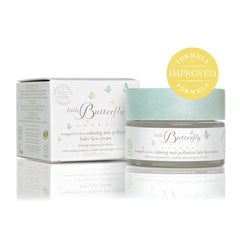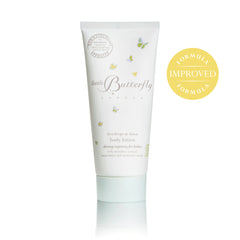The Ultimate Nappy Rash Treatment and Prevention Plan
Gentle Care: Guide to Preventing and Treating Nappy Rash
Babies skin is thinner and more passable than adults, therefore more prone to irritation due to substances such as baby poop and urine passing through the skin barrier more easily.
PH levels also factor in when it comes to babies' skin compared to adults, and a higher pH in newborn babies can influence the growth of bacteria and the skin's ability to naturally defend itself.
Conditions such as cradle cap, eczema, and nappy rash are most common in babies because of this and so it is important to adopt good skincare treatments to ensure hygiene, comfort and avoid irritation such as nappy rash.

What Is Nappy Rash?
It is incredibly concerning when your little one displays signs of discomfort around their bottom area.
According to the NHS, obvious signs of nappy rash include red rashy skin or generalised redness, skin that is hot to the touch, dry or scaly skin in the nappy area, blistering or pimply skin, and noticing your baby is generally uncomfortable and irritable.

Are You Sure It's A Nappy Rash?
Nappy rash is very common in babies however we would advise if in doubt seek advice from a healthcare professional to rule out other skin conditions or rashes you feel concerned about.
Don’t feel bad if your baby develops a nappy rash, in most cases it is easily treated and prevented using a high-quality nappy rash cream and a few simple steps to keep on top of your baby's skincare needs in this delicate area.

What Is Best For A Nappy Rash?
The following article will take you step by step through a preventative nappy rash routine or a treatment plan to heal existing nappy rash…
As stated throughout this guide if in doubt or symptoms persist consult your child’s healthcare professional for a medical opinion and to eliminate other skin conditions.
Proper diagnosis may be necessary and different types of rash can coexist so this is something to be mindful of, for example, a nappy rash caused by a fungal or yeast infection may need an anti-fungal cream and some rashes may be due to an allergic reaction to chemicals and products used at nappy change time.

Best Baby Bum Hygiene Practices
Prevention is better than cure when it comes to nappy rash so always maintain a good nappy change routine.
Avoid harsh products as chemicals in certain brands can irritate the skin, always wash the area with water and a natural product such as bubbles in the breeze top to toe wash at bath time and pat dry skin rather than rub.
Apply a barrier cream to ensure pee and poop cannot penetrate the baby's delicate skin and make sure your choice of nappies is effective when it comes to absorption, well-fitting, and changed often.
Lots of nappy free time is a great way to allow the skin to breathe and recover from frequent warm damp conditions sitting in a nappy can cause. Daily nappy free time really helps and you could incorporate baby massage into this session which is a wonderful way for you and your baby to bond.

Why Little Butterfly London Nappy Rash Cream?
Our soft as moonlight nappy change cream is more luxurious and conscious than most over-the-counter brands.
Having won beauty shortlist awards and been recognised as GOLD by The Green Parent magazine the quality of our products ensures only the best nappy change cream for your baby.
A little goes a long way and with soft as moonlight nappy change cream and our list of ingredients including shea butter, cocoa butter, and mango and cucumber seed.
With anti-inflammatory properties and a light zinc antifungal formula soft as moonlight nappy change cream prevents and treats all types of nappy rash.
Organic and cruelty-free, don’t just take our word for it, here are some thoughts on our nappy change cream…
"THE Ferrari of nappy creams!"
"Such an amazing product. Gorgeous natural scent, beautiful smooth creamy texture, got rid of the sore bum overnight. 100% recommend."
"Lovely textured nappy cream."
"Very different to what’s on the market - super luxurious. A little goes a long way!"
"Definitely worth the extra"
"This costs a little more than I would usually spend but it's worth every penny. A superb product that looks after my baby's bottom beautifully. It's a 5* from me!"

As mentioned, prevention is better than cure when it comes to nappy rash so incorporating a good routine now minimises the chances of your baby developing a nappy rash.
- Keep the area clean and dry
- Change nappies frequently
- Use a thin layer of nappy change cream
- Choose well-fitting, absorbent nappies
- Nappy free time is a must
- Avoid wipes and other products containing harsh chemicals
- Inspect baby's bottom area frequently for signs of redness or a rash
Keep the area clean and dry
The simplest way to avoid creating an environment for a sore area to develop on the baby's bottom is to keep the area clean and dry.
Change nappies frequently
The enzymes in poo can really break down healthy skin so regular nappy changes are crucial to not allow baby poo to penetrate and cause soreness or even a fungal infection.
Use a thin layer of nappy change cream
On that note, a thin layer of barrier cream ensures poo and wee are less likely to affect the baby’s delicate skin and will protect the nappy area in between changes.
Choose well-fitting, absorbent nappies
Whilst we don’t endorse a particular nappy brand, finding the best nappy which suits your baby is vital. Particularly if you are using cloth nappies, finding the best absorbency is crucial to protect the bottom, particularly from prolonged night time nappy wearing.
Nappy free time is a must
Be it during tummy time or before or after a bath time routine, nappy free time is a great opportunity to let the skin rest and breathe. Daily nappy free time is fun and all you need to do is pop a soft towel down and let baby feel free.
Avoid wipes and other products containing harsh chemicals
The majority of wipes contain harsh chemicals and plastics which can cause skin irritation. Clean water or our award-winning top to toe wash are a gentler option and pat dry with a soft towel before applying a thin layer of your barrier cream.

Inspect baby's bottom area frequently for signs of redness or a rash
Of course, you know your baby best so keep an eye on baby’s skin daily to prevent nappy rash or at least catch it in the early stages as prolonged exposure can lead to a fungal infection. If you do try soft as moonlight nappy cream we would love to know what you think of our award-winning nappy rash cream.
If your baby is struggling with nappy rash and symptoms persist consult your healthcare professional or health visitor who may advise antibiotics, hopefully following the above nappy rash prevention and treatment plan baby’s skin will remain healthy and free from irritation throughout their baby stage.
We hope this guide has helped you to be informed surrounding nappy rash prevention and good skin hygiene practices so hopefully your baby’s skin stays healthy and rash-free.
Do remember nappy rash is very common in baby’s so if your baby does suffer from a bout of nappy rash, you now know what to do to alleviate the signs and symptoms and keep the baby happy and comfortable.

You might also like to incorporate baby massage into your daily routine…
The benefits include bonding, relaxation, and stimulating your baby's senses.
Baby massage also allows the parent/caregiver the opportunity to relax and unwind with their baby.
We would recommend learning the correct baby massage techniques from a qualified baby massage practitioner and incorporating our love eternal baby massage oil into your baby massage and nappy free time routine.


